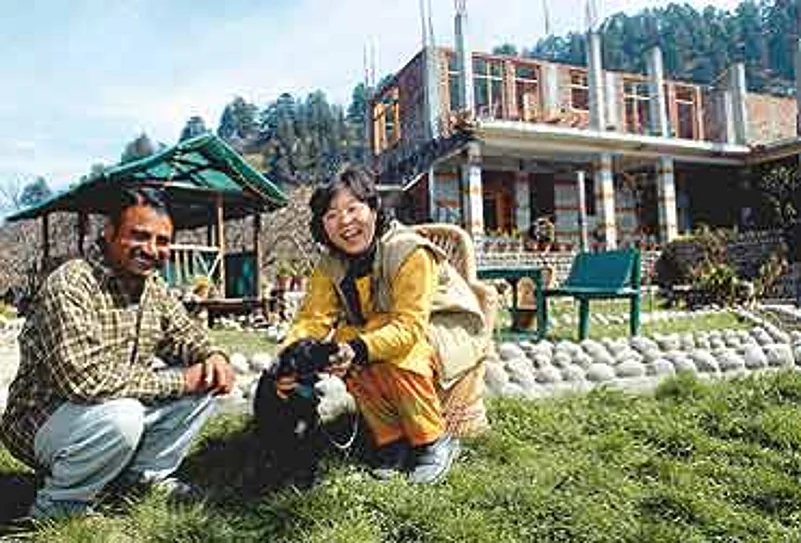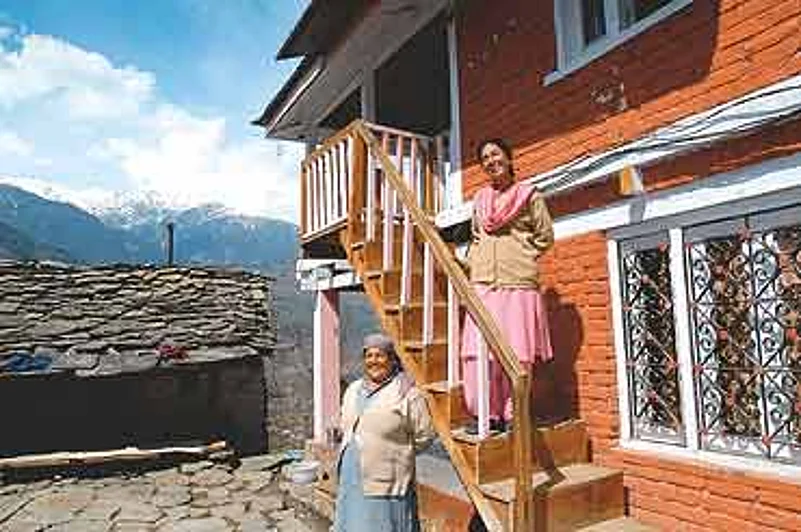The rooms boast neat beds and two separate bathrooms (a rarity in this part of the world), and the duo specialises in dishing out local specialities like Siddu (which resembles momos) to their guests. The guests are also welcome to use their 160-year-old stone kitchen to whip up an occasional meal for themselves. At Rs 70, this accommodation is a lot cheaper than the Rs 300 per day charged by even the most modest guesthouses in Naggar village. While Meera’s thinking of revising the rates with the onset of tourist season early next month, Chitra is wary. She thinks the present rates are just fine. After all, "we want them to come again", she says in halting English.
So what’s new, you might ask, given that the residents of Kullu and Manali have always had an open-door policy as far as tourists are concerned? Well, Incredible India has a special rural focus this time and the tourism ministry is lending residents of Naggar village in Kullu—and several other villagers in different states—a helping hand. This year’s budget announcement has not only underscored the importance of promoting rural tourism, but has identified 63 sites in 22 states—where around Rs 50 lakh each is proposed to be spent.
This includes monetary help for carrying out necessary renovations to villagers who want to rent out their premises. Along with giving a boost to the rural economy, the ministry also has other plans, like developing facilities to popularise trekking in and around this region. Making an exception for rural tourism, the government isn’t even taking any share of the profits, allowing the villagers to keep it all.
As expected, villagers in Himachal Pradesh have taken to the scheme like a charm. Close to 30,000 tourists come to trek in the region every season and Naggar village in Kullu district is hoping to cash in on the numbers by persuading more villagers to throw open their doors. "The main idea is to help the communities participate in promoting tourism...where they too can partake of the profits," says joint secretary, ministry of tourism, Amitabh Kanth. Incidentally, a few non-governmental organisations(NGOs) have been given the task of acting as interface between the people and the government.

Ram Chand and Yuni are adding four rooms
Early this year, 11 families in Naggar were identified for extensive training, which includes rudimentary things like the basics of English and a heightened sense of hygiene. Teachers from the nearby school of social work have been roped in to teach the villagers to sharpen not just their culinary skills but also social awareness. "The villagers need to be trained in safeguarding their privacy and that’s why detailed instructions on safe sex, HIV/AIDS form part of the study designed for women," says local worker Rajesh Sharma.Sharma, along with the UNDP which is partnering the ministry of tourism, has prepared a special teaching capsule for the women of Naggar that begins with simple instructions on how to keep their homes clean.
Given that Manali has earned a fair share of notoriety, thanks largely to its reputation for having the finest hashish available, locals are also being taught on how to handle tourists who might spell trouble. "I discourage smoking in my house," says Yuni, a Korean who has made her home in Naggar. Yuni married local man Ram Chand a year ago and is planning to renovate her house. "I have taken a loan of Rs 2 lakh from Punjab National Bank to add four rooms to my house," says Ram Chand. Their home reflects a unique blend of Korean and Kullu hospitality. And to stress their cosmopolitanism, Yuni says three types of cuisine are served at home. Yuni and her husband certainly serve delicious plum and apple juice, the small patch devoted to growing vegetables and fruit perhaps the key to it.

Meera and Chitra Sharma await the ‘season’
Moving away from the traditional brick-and-mortar approach to developing tourism infrastructure, the ministry is waking up to the importance of allowing villagers to have a say. After all, the rural tourism scheme is all about their life being packaged for the tourists. So different models are being developed, depending on regional customs and demands. Persuading villagers to rent out their premises may work well in Himachal, but it’s not an acceptable model everywhere. In Nagaland, for instance, villages did not want tourists in their homes. They opted to build separate cottages, and from the money made available by the ministry, they have built exact replicas of their homes to be rented out. "The maintenance of the cottage is with the community and the money goes back to them," says Kanth. NGOs working with the UNDP make available another Rs 20 lakh for evolving software packages with special training programmes tailored to the needs of the villagers.
Meanwhile, back in Naggar, Vinod Kumar is planning to take a Rs 50,000 loan to construct bathrooms for his guests, after which he plans to rent out two rooms. "I will offer them a taste of real rural life...they’ll be coming back again and again," he says confidently. Vinod’s dreams may still take some time though, the money won’t be coming that easy. For while the Centre has sanctioned the sum, the state government is taking its own time to pass it on. Kullu deputy commissioner Chamel Singh, the pointsman between the Centre and the state, says, "Rs 50 lakh is a lot of money...it can be spent only after assessing the interests of the villagers." To begin with, he has disbursed Rs 2 lakh for improving sanitation and lights in the area. "I will start disbursing more money once the villagers come out with a concrete scheme on their requirements," says Singh.
The tourism ministry, though, has no such reservations. It’s going full steam ahead, and plans are afoot to market and advertise rural tourism in a big way (for the first time!). India is no tourist hotspot currently, but it’s getting there. The numbers, say official records, have increased by 15.1 per cent from last year. Foreign exchange earnings are up too, from Rs 2,326.20 crore to Rs 2,722.07 crore. Rural tourism may just be a blip on the Indian tourism scene now, still the locals aren’t complaining. They have a share of the spoils and who knows what fortunes tomorrow will bring in its wake.


























